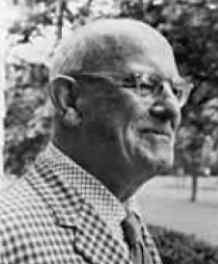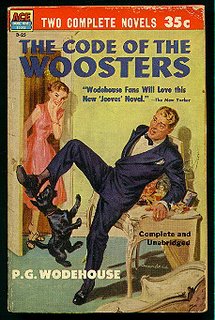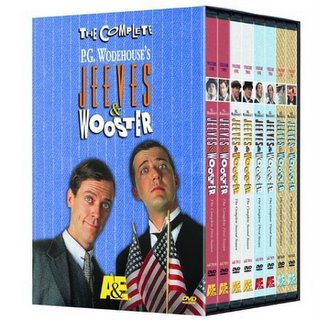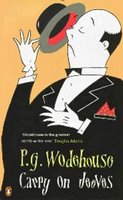
On Tuesday, Cara blogged about laugh-out-loud Regencies. As an author who tries, in her own modest way, to get people to laugh, it made me think about where my humor comes from. Some of it is unique to me: a father who loves language so much he’s got a wall full of word books (and, by the way, owned a copy of the 1811 Dictionary of the Vulgar Tongue long before I knew what a cully was), an abiding love for the Marx Brothers, stoked by frequent afternoon visits to the Harvard Square Theatre, not to mention devouring Scooby-Doo at an early age. Oh, those meddling kids!
But probably the most formative source was P.G. Wodehouse.  Like most everything else I read when I was young, I found his books in the room we called the library, but was really the place we threw all the books in the house (Bookcases were optional). I started with a Jeeves book, I’m fairly certain, and was immediately entranced with Wodehouse’s dextrous way with language. Simply put, the man is incredibly dry, terribly witty, and flat-out hysterical.
Like most everything else I read when I was young, I found his books in the room we called the library, but was really the place we threw all the books in the house (Bookcases were optional). I started with a Jeeves book, I’m fairly certain, and was immediately entranced with Wodehouse’s dextrous way with language. Simply put, the man is incredibly dry, terribly witty, and flat-out hysterical.
I grabbed a recent stoop sale find, A Wodehouse Bestiary, and opened it randomly to find this little gem:
“You’re what I call a rabbit.”
“A rabbit!”
“There is no stigma attached to being a rabbit,” said Sir Joseph, pacifically. “Every man with a grain of sense is one. It simply means that you prefer a normal, wholesome life to gadding about like a — like a nonrabbit. You’re going out of your class, my boy. You’re trying to change your zoological species, and it can’t be done. Half the divorces today are due to the fact that rabbits won’t believe they’re rabbits till it’s too late. It is the peculiar nature of the rabbit–”
“I think we had better join the ladies, Uncle Joseph,” said Roland, frostily. “Aunt Emily will be wondering what has become of us.”
Dry as a bone. I love it.
I’ve read every Wodehouse I could lay my hands on. And since he published ninety-six books, I’m fairly certain there are some I have missed–a treat I’ll save for my golden years. His Jeeves & Wooster books were turned into a miniseries, but even actors such as Hugh Laurie and Stephen Fry in the titular roles aren’t able to translate Wodehouse’s delicate touch from the page to the screen.

Hugh Laurie, who portrayed Jeeves in the British miniseries, writes about Wodehouse (full text by following this link):
To be able to write about P. G. Wodehouse is the sort of honour that comes rarely in any man’s life, let alone mine. This is rarity of a rare order. Halley’s comet seems like a blasted nuisance in comparison.
If you’d knocked on my head 20 years ago and told me that a time would come when I, Hugh Laurie – scraper-through of O-levels, mover of lips (own) while reading, loafer, scrounger, pettifogger and general berk of this parish – would be able to carve my initials in the broad bark of the Master’s oak, I’m pretty certain that I would have said “garn”, or something like it.
(As a sidenote, both Laurie and his partner, Stephen Fry, who played Wooster, are also published authors in addition to being actors. Stephen Fry talks about Wodehouse here).
Humor is so hard to convey. Too much, and you’re doing slapstick; too little, and all you get is a wan smile. P.G. Wodehouse achieved the perfect (dry) balance in most of his writing.
Have you read Wodehouse? If not, there are plenty of short story collections that’ll give you a taste of his style. If so, do you like him? What other humor authors, outside of romance, do you like? What’s your favorite kind of written humor?
Me, I’m dicing back into “Something Squishy” from A Wodehouse Bestiary.
Megan








